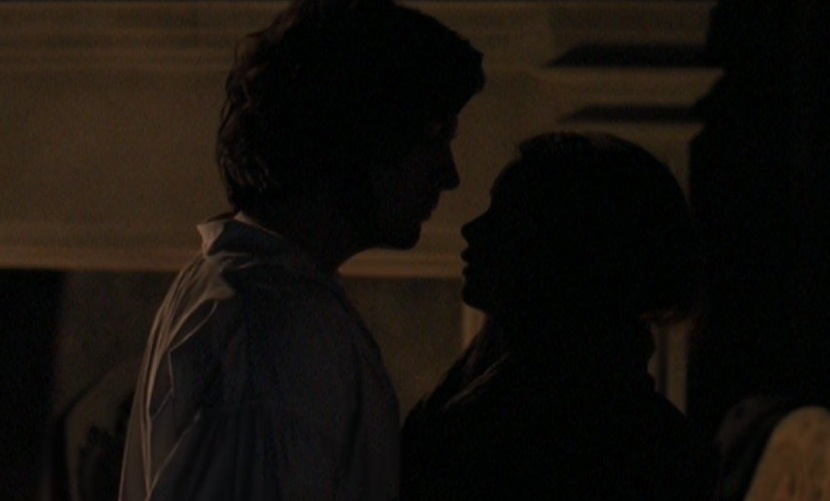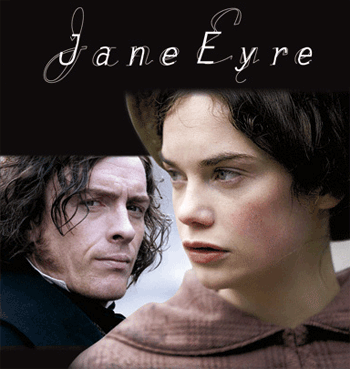
So BronteAlong is only one week old, and already we've been picking up quite a bit of steam!
 So here I am, just back from watching the new Jane Eyre.
So here I am, just back from watching the new Jane Eyre.
I am feeling rather stunned by it, and I want to rest, but I feel I need to talk to you about it first.
I am feeling rather stunned by it, like Jane does in the beginning, when she is hit hard, and her ears ring, and everything else is muted.
But we need to talk.
First, let's get this out of the way: It is too short.
I was expecting it to be abridged, of course. It's movie length, after all, and the book is quite long and complex. A good deal of boiling down had to occur.
I was even expecting to feel irritated at the inevitably short shrift that certain scenes, certain themes, would get in this version. To want to discuss, after, the pros and cons of this version against its predecessors. Strengths, weaknesses. Room for improvement.
But I didn't. And I can't.
I loved it so much it hurts.
It's certainly not without its flaws. But I stand by that: I loved it so much it hurts.
Something about this version was like a gut punch to me. I still feel like holding my midsection, and concentrating on my breathing -- careful, shallow, and slow.
In fact, I think I held my breath through most of the last two hours. And now, my lungs hurt. My throat is sore.
Bear with me.
So: yes. It was abridged. It was abridged in the way that movie trailers are. Entire scenes were compressed into brief flashes of light. Entire characters were distilled into a few barely overheard lines of dialogue, off-camera. Blurred.
It was like seeing the whole story through a half-filled slide projector. It was like those ads that you see on trains sometimes, flashing past your window as you go hurtling by, the series of images briefly, indelibly searing themselves onto the back of your mind.
It was like remembering a dream, in rapidly evaporating snatches that still, for a few wonderful, frustrating hours, somehow manage to evoke the whole.
I loved it so much it hurts.
But it was not perfect, not by any stretch.
For instance, I can't imagine what it was like to see this version as a newcomer to this story. Literally: I can't, in all honesty, begin to fathom what it feels like to be a newcomer to this story, I have lived with it for so long in my skin. Did this version do it justice for those first-time viewers? Probably not.
Truly? I can't say that I care a great deal about those viewers.
Let's face it, I'm pretty intensely selfish about the story of Jane Eyre. I'm selfish about Edward Rochester. When I turned around and saw all those people at the end, I felt angry that they had all been there for such an intimate thing.
Perhaps jealous is the word I am looking for. No? I think that it is.
For me, this version felt like the book. It felt like the loneliness and solitude of the book, and like the barrenness of the book. The incandescent joy of falling in love with Rochester -- and of being loved by him -- was painful in its brightness, in its glare, against that backdrop of bleakness and deprivation, just like it is in the book.
The agony of the scene in the library, after the botched wedding, a scene which so many versions shy away from, was perfect. It gutted me, eviscerated me, in exactly the way I like this story to gut me.
The ending was too abrupt. Grace Poole was all but absent. Some methods of abridgement were far less successful than others.
But I stand firm.
Let's face it: Jane Eyre is my favorite story. I love it in its whole; I love it in its particulars.
The fact that this version was retold in snatches, like recalling a dream, was utterly, wrenchingly effective for me.
FLASH John Reed hits me FLASH Mrs Reed hates me FLASH Lowood School hurts me FLASH Helen Burns leaves me FLASH
FLASH
FLASH
A horse falls in the woods
FLASH
A fire in the bedroom
FLASH
A crack of lightning splits the chestnut tree
FLASH
FLASH
FLASH
Whitecross, the moors
FLASH
FLASH
Jane. Jane.
I am coming.
...
I do recognize that I am an easy mark. Do not think that I am blind to this fact, that it evades me somehow.
It may well not have been this Edward Fairfax Rochester, this Jane, this Blanche, this carriage ride, this moorland, that was at all magical or powerful. Maybe it was all muscle memory, and this movie merely evoked just enough of the story to revive all my oldest, deepest feelings for the book.
I have no idea, quite frankly.
But for me, each component part stood up, took place, took its pose, as the tableau that I knew in my heart, each successive scene pulling the breath out of me more, until finally I was just
breathless.
Yes: The ending was too abrupt. I needed much more.
But I will always need more of this story. I will always need more of Rochester, of Jane.
I've written, elsewhere and at length, about what deeper meanings Jane Eyre holds for me, personally and professionally.
I told you, it's my favorite story, ever.
And I am just a lousy critic of this story, is the thing. I am quite entirely incapable of being at all evenhanded in my judgements with this story.
So yes. Yes, later, let's talk about this soberly. Let's dissect what worked, what didn't, what compressions left you lacking, what alterations left you wanting.
I will. I will write about this more, later.
But not now.
Right now I need to breathe.
Related: Check out the later conversation I had with fellow blogger and Jane Eyre freak @Fellowette, in which we went into all the messy details of what made this version rock so hard.

So BronteAlong is only one week old, and already we've been picking up quite a bit of steam!

Join us.